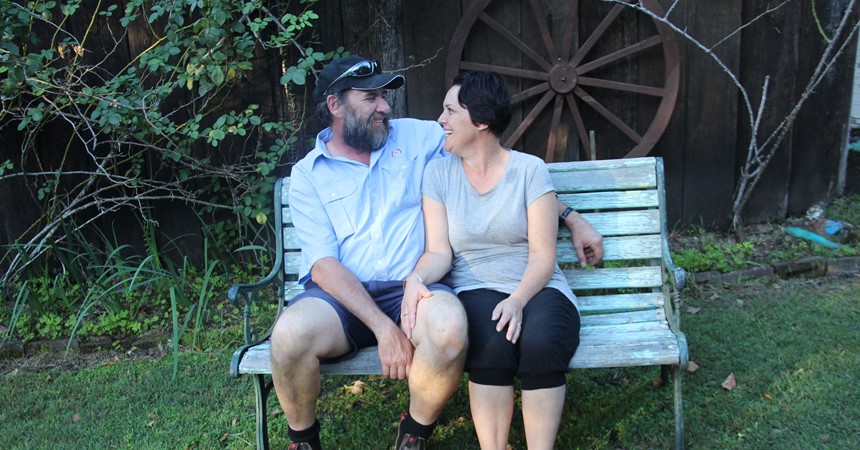With baby photos lining the walls and toys strewn across the floor, this family home looked like any other, except that the Hopsons’ story is unique.
Sharon and Scott’s journey to become parents started long before two foster children came into their care. The couple, who tried to have children for a number of years, then made a decision to apply to become foster carers with CatholicCare Social Services Hunter-Manning.
Shortly after they were approved as carers, their dream of having a child was answered. They received a phone call asking them to care for a then nine-month old baby boy.
“We had one week to prepare and get everything set up,” Sharon said.
Reflecting on the moment Sharon first saw her son, she said, “We got sent a photo of him and I immediately burst into tears.”
Six months later, the couple received another call to ask if they would also provide a home for a three month old baby girl – who is the sibling of the boy they were already caring for.
Sharon and Scott were thrilled to accept the baby girl, however with two babies under two in their care − although feeling very blessed − they were also somewhat overwhelmed. Just like many parents in that same situation, they felt that they needed additional support. The couple expressed this feeling to their Case Manager who then referred them to the CatholicCare Sinergie Project, part of the Parenting Hub which sits within the Early Intervention Unit.
Sinergie Family Worker, Rachel Armstrong, began visiting the family at home to help build the couple’s parenting skills and, most significantly, their confidence. As we all know, there is no manual that comes with children so it can be unsettling for new parents. It can be even more complicated and challenging when children have needed to be removed from their usual environment for their own safety and development. Naturally, these children were affected by their move.
Rachel’s regular visits to the couple allow them to discuss any new challenges as they arise along the developmental milestones in the children’s lives.
She assists the parents with problem-solving around difficult behaviours such as tantrums and sibling rivalry.
Rachel also tailors the parenting techniques to the needs of the children.
“Because both the children have developmental trauma, the style of parenting that Scott and Sharon use has to be adapted to the children’s individual needs,” Rachel said.
“Part of my role is to help build Sharon and Scott’s therapeutic parenting skills as children with a trauma history do not typically respond in the same manner to mainstream parenting methods as children without a trauma history,” Rachel said.
Undoubtedly the most stressful times for parents of young children are mornings and evenings.
To address this, Rachel has worked with the eager parents to develop routines for the busiest times of the day.
“There have been a few challenges with sleep and eating,” Rachel said.
“I have visited the family in the morning and in the evening, to observe the children’s behaviour and the family dynamics and then I suggest practical strategies.
“Together with Sharon and Scott we’ve developed a feed, play, sleep routine which has led to some great results,” Rachel said.
Sharon and Scott are pleased with the difference in the children’s behaviours as a result of bringing their newly acquired skills into play.
“We’ve noticed significant changes since seeking Rachel’s help,” Sharon said.
Armed with tailored techniques to manage behaviour, and confidence instilled by Rachel, the couple is enjoying long-awaited parenthood.
“I can’t imagine having kids and not having the support we have had access to through CatholicCare,” Scott said.
Parenthood comes with challenges and further support is often required to manage difficulties along the way. CatholicCare’s Early Interventions caseworkers form part of the organisation’s wider Parenting Hub team. When partnering with families, CatholicCare staff acknowledge and incorporate each family’s individual circumstances and beliefs into suggested strategies. The focus of discussions varies, depending on the needs of each family and may include, but not be limited to, behavioural advice, positive parenting tips, mental health and encouraging learning opportunities.
If you need parenting support, whatever the issue, large or small, please contact us to find out how we can help on (02) 4979 1120 or visit www.catholiccare.org.au.

